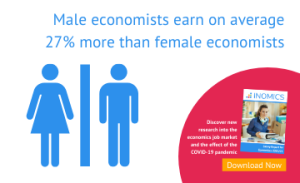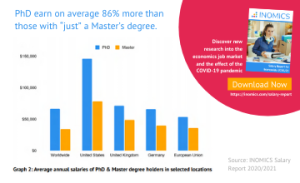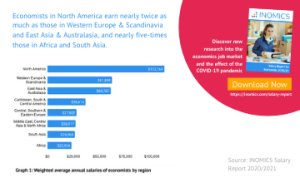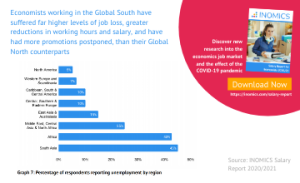Economists with PhD Earn 86% More - INOMICS Salary Report 2020/21 Incl. COVID-19 Impact
Based on survey data from nearly 1,500 economists, new report examines economics salaries, health of job market, effect of COVID-19 and gender pay-gap.

Berlin, Germany, May 27, 2021 --(PR.com)-- INOMICS - the career and education site for economists - has released the latest edition of its annual report, which examines the salaries of economists worldwide. Based on anonymous survey data of nearly 1,500 economists, the INOMICS Salary Report 2020/21 answers questions like where economists earn the most money, whether doing a PhD is a worthwhile financial investment, and about the significance of the gender pay-gap in economics. It also includes testimony on exactly how the pandemic has affected economists’ working lives.
The key findings of the INOMICS Salary Report include:
1) PhDs - Having a PhD still matters. They found that globally economists with a PhD earn on average 86% more than those with “just” a Master’s degree.
“The United States is still the most lucrative job market for economists in the world. Annual salaries here – across all sectors – surpass those available anywhere else.”
2) COVID-19 - Over a third of economists have had their current job or their career progression negatively affected by the coronavirus pandemic. The effects have hit the Global South disproportionately, with 60% of economists in Africa and 58% in South Asia reporting being negatively affected by the pandemic professionally, compared with just 23% in North America, and only 17% in Western Europe & Scandinavia.
3) Gender - Male economists earn on average 27% more than their female counterparts. The data indicates that in most regions this is a result of a “glass ceiling” and a “leaky pipeline,” rather than a disparity in pay of male and female economists at the same career stage.
4) Pay - The United States is still the most lucrative job market for economists in the world. Annual salaries here – across all sectors – surpass those available anywhere else.
The full report is available to download on the INOMICS website: inomics.com/salary-report.
For more information on how the report was compiled or extra information on our findings please contact info@inomics.com.
If you would be interested in partnering with us to conduct future surveys or research, please contact us. We are always looking to expand and improve our work and if you think you can assist with this, please email info@inomics.com.
About INOMICS
INOMICS is an online platform that helps students and researchers in economics reach their academic and professional goals. This is achieved through the provision of a personalised feed of opportunities, of jobs, courses, programs, and grants, updated daily and tailored to match one’s own specified ambitions. With an expert community of over 500,000 academics and students from around the world INOMICS has a proven track record of helping its members take that next step - it is "the power of niche recruitment."
The key findings of the INOMICS Salary Report include:
1) PhDs - Having a PhD still matters. They found that globally economists with a PhD earn on average 86% more than those with “just” a Master’s degree.
“The United States is still the most lucrative job market for economists in the world. Annual salaries here – across all sectors – surpass those available anywhere else.”
2) COVID-19 - Over a third of economists have had their current job or their career progression negatively affected by the coronavirus pandemic. The effects have hit the Global South disproportionately, with 60% of economists in Africa and 58% in South Asia reporting being negatively affected by the pandemic professionally, compared with just 23% in North America, and only 17% in Western Europe & Scandinavia.
3) Gender - Male economists earn on average 27% more than their female counterparts. The data indicates that in most regions this is a result of a “glass ceiling” and a “leaky pipeline,” rather than a disparity in pay of male and female economists at the same career stage.
4) Pay - The United States is still the most lucrative job market for economists in the world. Annual salaries here – across all sectors – surpass those available anywhere else.
The full report is available to download on the INOMICS website: inomics.com/salary-report.
For more information on how the report was compiled or extra information on our findings please contact info@inomics.com.
If you would be interested in partnering with us to conduct future surveys or research, please contact us. We are always looking to expand and improve our work and if you think you can assist with this, please email info@inomics.com.
About INOMICS
INOMICS is an online platform that helps students and researchers in economics reach their academic and professional goals. This is achieved through the provision of a personalised feed of opportunities, of jobs, courses, programs, and grants, updated daily and tailored to match one’s own specified ambitions. With an expert community of over 500,000 academics and students from around the world INOMICS has a proven track record of helping its members take that next step - it is "the power of niche recruitment."
Contact
INOMICS
Lucia Leguizamo
030208471250
https://inomics.com
Lucia Leguizamo
030208471250
https://inomics.com
Multimedia

Gender Gap in Economics
Male economists earn on average 27% more than female economists.

PhD Earnings Compared to Master Level
PhD earn on average 86% more than those with "just" a Master's degree.

Best Region for an Economist to Work
Economists in North America Earn nearly twice as much as those in Western Europe and Scandinavia and East Asia & Australasia, and nearly five-times those in Africa and South Asia.

COVID and Employment
Economists working in the Global South have suffered far higher levels of job loss, greater reductions in working hours and salary, and have had more promotions postponed, than their Global North counterparts.

INOMICS Salary Report 2020/2021
Your Key Insight to the Economics Job Market
Categories
